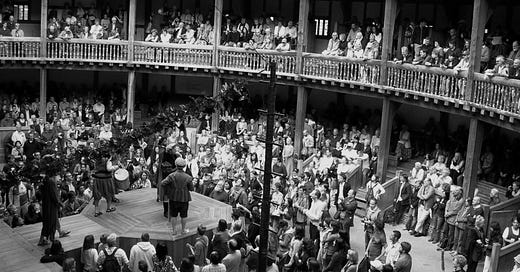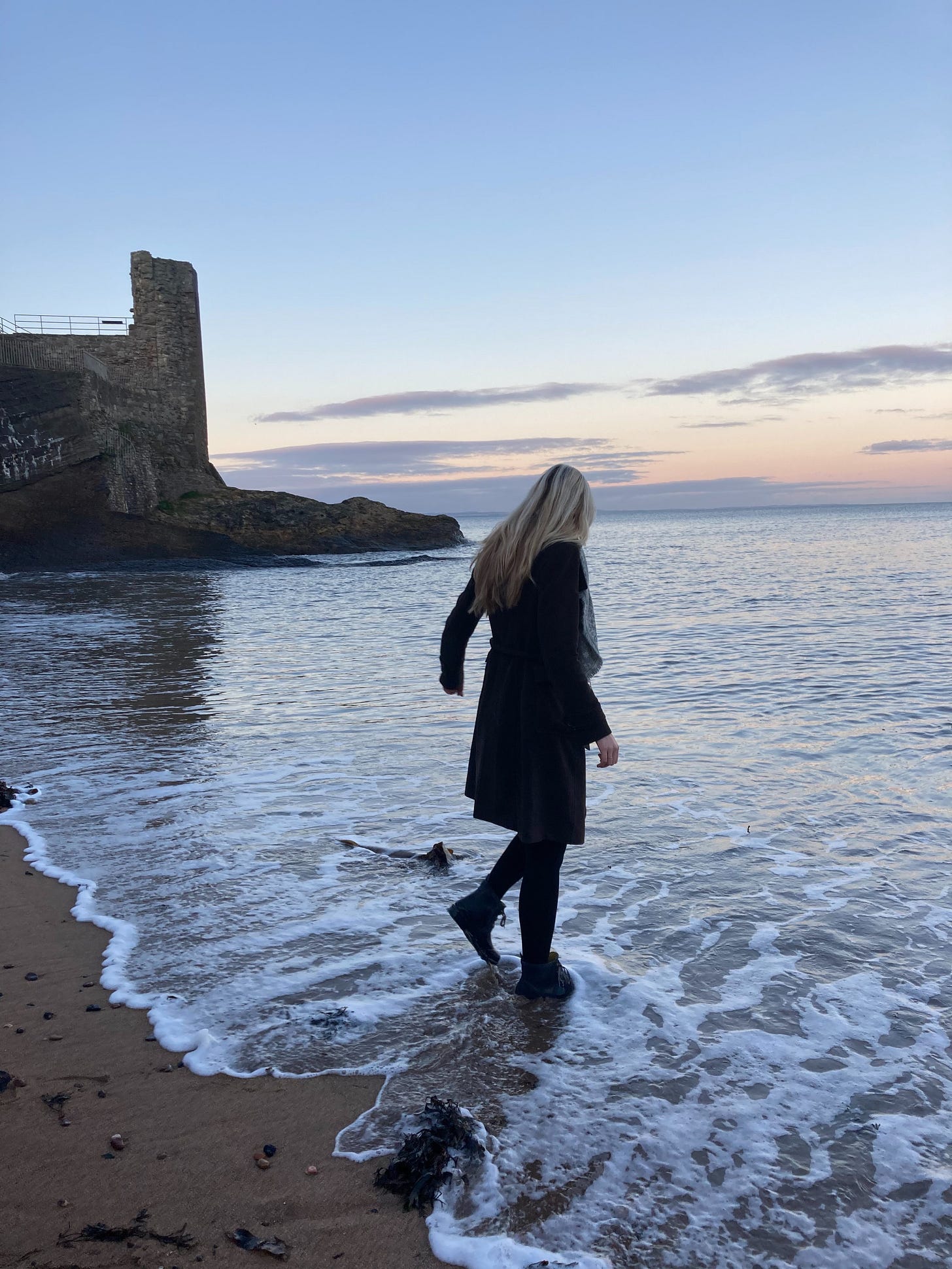I performed in my first Shakespeare play at age 8, wearing a mushroom-shaped hat and doing the best impression of Denzel Washington that I could muster (informed by cassette tapes recorded from Kenneth Branagh’s Much Ado About Nothing).
Since then, Shakespeare has been a constant companion. A high school seminar on The Merchant of Venice taught me that life can’t always be sorted into “good guys” and “bad guys.” I fell briefly in love with the guy who played Henry IV in the college play I saw when I was 13. I played a niche goddess in Twelfth Night and began to realize that my skills were perhaps not weighted toward performance.
Shakespeare’s words echoed in my mind throughout my school days, fueled by after-school rehearsals and movie nights (Kenneth Branagh struck again with a surreal As You Like It set in colonial Japan). I fell madly, manically in love with Cymbeline when friends performed it in my college arboretum. I made a pilgrimage to the Globe Theatre in London, where I paid about £5 to be a “groundling,” standing in the crowd that surrounded the stage.
So it came naturally when, in 2020, I started writing my dissertation on Shakespeare, Dostoevsky, and the narrative quality of human life in a dark little flat in St Andrews, Scotland. I walked along the grey coast of the North Sea and asked myself the questions Shakespeare had seeded in my mind so long ago—what does it mean to tell stories about ourselves? What do we need in order to tell them? What do we do when those stories fall apart?
I successfully defended my dissertation in 2023, walking away with a Ph.D. in theology, the imagination, and the arts, but I’m still asking those questions. When I tell people I study Shakespeare, the response is almost always the same: “I hated Shakespeare in high school.” (The only one of my friends who gets similar answers is a high school math teacher.)
And that always breaks my heart a little bit, because if you hated Shakespeare in high school, it wasn’t your fault, and it wasn’t Shakespeare’s. From a young age I was immersed in Shakespeare’s plays as performances, as immersive imaginative worlds, as encapsulations of the universal human drama. Especially as English speakers, but simply as human beings, Shakespeare is our rightful heritage. Yes, his language is antiquated. But it’s not Old English. It has a rhythm and rhyme that can quickly become transparent with the right teachers and the right performers.
With that out of the way, Shakespeare’s striking human stories unfold. And it’s those stories that I want to focus on here. It’s easy to think that the driving concerns of people in Elizabethan England or revolutionary France or 1890s Canada were dramatically different from our own, but the power of literature is to communicate to us that they were not. The joys and griefs and problems and ambitions of human beings have a remarkable power to shed light on one another across cultures and ages.
Across the aisle from people who think literature has nothing to teach us are people who think contemporary culture has nothing to teach us. I’ve been one of those people (a blessed high school teacher dissuaded me from writing a thesis about how non-rhyming poetry isn’t real poetry), so I can speak directly to the mindset. Especially in religious circles, it can be tempting to see the world today—TikTok, Charli XCX, the Barbie movie and the Super Bowl and the tangled mess of party politics—as a den of corruption. Avert your eyes, we tell one another. Nothing to see there.
But there is a lot to see there. Sure, there’s plenty of stuff that could be called “contemporary culture” that I disagree with or find distasteful. But Shakespeare’s plays are also packed full of bad people and bawdiness—they are not disinfected by being old. Shakespeare’s plays contain both good and evil because life itself contains good and evil. I’m interested in knowing more about what it looks like for a human being to struggle to choose what is right, to fight for power or for love or for survival, to find her way back to a home she might not be able to articulate. And those stories play out every day not only on the many stages where Shakespeare is still performed, but on the stage of our common life in the present day.
So I want to bring the two together. Substack is overflowing with cultural commentary, but much of it is polemical and exhausting, just like everywhere else. There are exceptions—some excellent writers on contemporary issues (I will be recommending them). But I think viewing contemporary life through a Shakespearean lens will enable us to see that our problems are far from new. And the solutions—becoming a better person, taking courageous action, building resilient communities—haven’t been tried and found wanting, or found difficult and left untried. They have been struggled toward by the people who came before us, who had some successes and some failures, just like we will.
In fact, the perspective of the past might allow us to take ourselves a bit more lightly. Nothing is new under the sun—from doom-and-gloom political commentary to the plethora of issues between the sexes. That’s why I chose for the title a passage from my beloved Much Ado About Nothing, where Shakespeare urges us to find a little bit more joy in the pursuit of being human:
So that’s the vision here. I’m excited to have you along for the journey.
See you next week,
Emily
PS: If you’re reading this from your inbox, I’d love to hear what motivated you to subscribe—what are you looking for from this Substack? Are you a Shakespeare fanatic, or just dipping your toes in? Do you have your own project that I can subscribe to? Leave a comment and I’ll write you back!









Emily! Hello! I have been combing substack for people who actually know how to write about literature and then it struck me...didn't Emily just start a Substack?? I am so excited to follow along with your project. I am alsoooo writing about fiction here and why it matters! Let's be substack buddies!
"Sigh no more, ladies sigh no more...." Now I will have the little ditty stuck in my head (also from Kenneth Branaugh's Much Ado) until your next post which I await with bated breath, Emily!